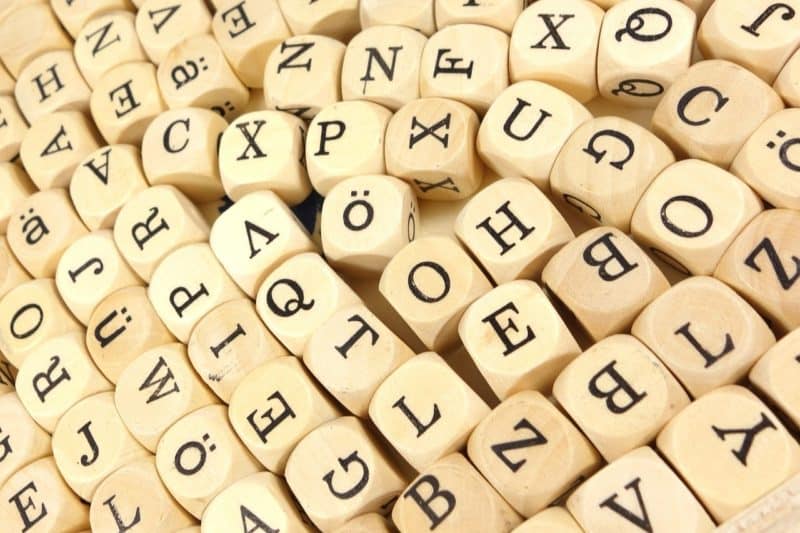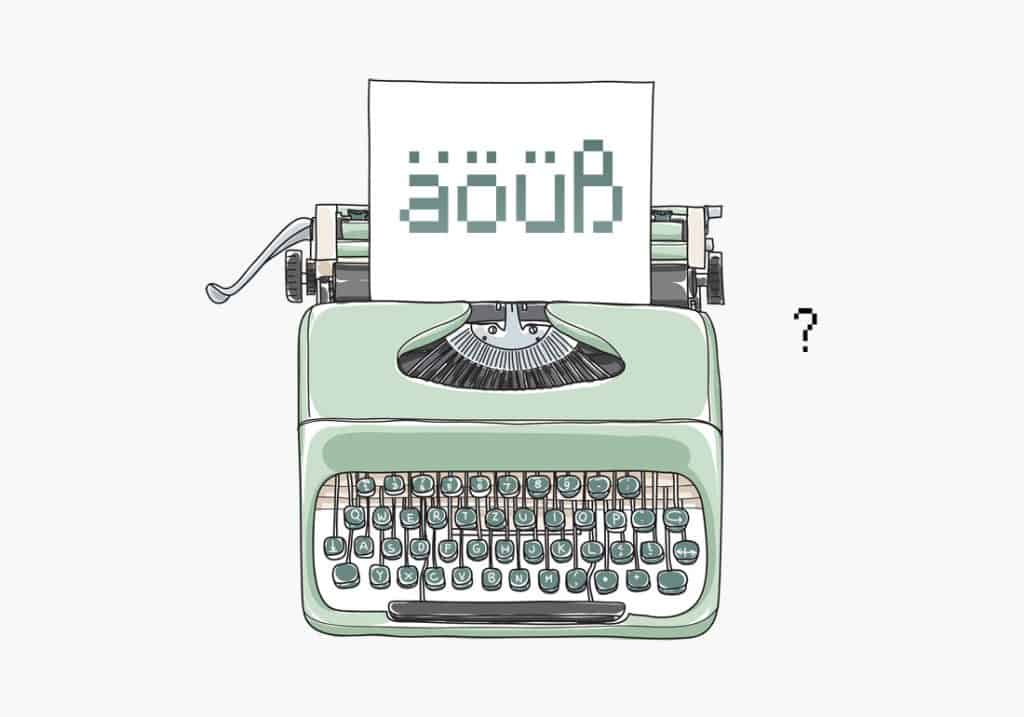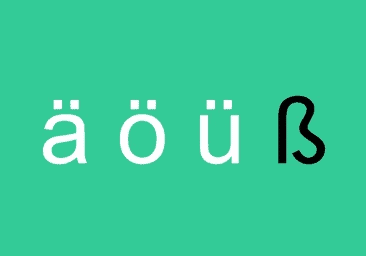The German language is, similarly to most languages, a challenging yet rewarding thing to learn. Depending on your native language, you might find yourself struggling with certain elements more than others. For predominantly English-speaking audiences, oftentimes the challenges faced include unfamiliar symbols, pronunciations in unfamiliar areas of the mouth and throat, and silent letters in words that an English speaker would assume need to be verbalised. Native English speakers might also be surprised to discover there are letters in the German alphabet that don’t exist in English – the most famous one being the letter ß, which many English speakers may be intimidated by. Once you master the pronunciation, your German friends will be so impressed and invite you to have some bier. Cheers!
German Pronunciation: The German Alphabet

Similar to the English language, German has 26 letters in their alphabet that correspond to a through z in English.
However, unlike the English language, German has three additional vowels known as the umlauts in English and die umlaute in German. The German alphabet pronunciation is a bit different.
The umlauts are the vowels ä, ö and ü.
Finally, there exists one more letter in the German language that simply doesn’t exist in the English language. That letter is ß or estset and has its own pronunciation that many native English speakers struggle with. Keep practicing and make yourself familiar with the sounds is always the best way to learn German.
You don’t have to be one of those English speakers, though! Simply watch this video for a thorough guide on how to pronounce each letter, including the ä pronunciation, ö pronunciation and ß pronunciation:
| Alphabet | Pronunciation and German Example | Alphabet | Pronunciation and German Example |
| A a | like apple, in “aber” | P p | like police, in “Polizei” |
| B b | like baby, in “Baum” | Q q | like collar, in “Quelle” |
| C c | like create, in “chatten” | R r | like rich, in “reich” |
| D d | like dad, in “Delfin” | S s | like sun, in “Sonne” |
| E e | like egg, in “Elefant” | T t | like tight, in “Tiger” |
| F f | like fountain, in “Fisch” | U u | like you, in “universell” |
| G g | like goat, in “gut” | V v | like fish, in “vergessen” |
| H h | like high, in “Haus” | W w | like vase, in “Was” |
| I i | like ignore, in “sieben” | X x | like X-ray, in “Xilofon” |
| J j | like yellow, in “Ja” | Y y | like yoga, in “yacht” |
| K k | like kite, in “Kuchen” | Z z | like ts, in “Zeit” |
| L l | like land, in “Land” | Ä ä | like melon, in “Äpfel” |
| M m | like mouse, in “Maus” | Ö ö | like girl, in “Öl” |
| N n | like night, in “Nacht” | Ü ü | like yu, in “über” |
| O o | like order, in “Ostern” | ß | double s, in “Straße” |
German Pronunciation: Special Cases

There exist special conditions and rules in the German language that otherwise wouldn’t typically exist in English. Mastering these special conditions will have you sounding more fluent sooner than you might have anticipated. Keep in mind that the double vowels combination may sounds a bit different from English, words with “ei” in them worth listening twice as practices.
Don’t be too intimidated next time you’re trying to read something in German with these guidelines in mind:
| Rules | Examples |
| Pronunce j with a y sound | jeder |
| Every consonant must be pronounced | abwaschen |
| d sounds like t in the end of a word | Lied |
| g is always hard g | geben |
| g sounds like k in the end of a word | Katalog |
| s sounds like z before a vowel | Seile |
1. Pronounce the letter j with a y sound
- German: jeder / English: young
2. Say every consonant present in the word
- German: abwaschen / English: to wash up
3. If there’s a d at the end of a word, it’s pronounced like t
- German: Lied / English: song
4. The letter g will always be pronounced like the hard g in English (get, go, gate) if at the beginning or middle of a word. However, if at the end, it is pronounced like the letter k.
- German: geben / English: to give
- German: Katalog / English: catalogue
5. If preceding a vowel, the letter s will be pronounced like z
- German: Seile / English: ropes
German Pronunciation: How to Practice

Now that you have these basic tools, the only steps left are to get even more! Luckily for you, there’s a world full of resources for you to practice this language and find even more vocabulary to practice with.
In the current age of digital learning, some great online resources to learn more include:
Those accompanied by real-world application of the language will have you fluent in no time. Don’t be afraid to:
- Seek German speakers in your community and kindly ask if they can help you or give pointers and tips
- Approach German schools in the area and find out about any classes you can take
- Look online for any German people who might be willing to do some language exchange exercises for mutual learning.
Remember, fluency comes from practice. A person can read as many books and download as many apps as their storage space will allow but the real learning comes from taking what those resources have given you and using them in the real world. You may even feel embarrassed to make mistakes but those mistakes will eventually become learning experiences with which to gradually improve. And of course, finding a German tutor using German as native language can certain help our pronunciation and make you speak more like a native speaker.

Similarities Between German and English
Despite this, English speakers will be pleased to know there are many easy elements to learning the German language. These include:
Capitalised nouns
The German language is unique in that every time a noun is written out in a sentence, it is preceded by a capital letter. English speakers are familiar with the practice of capitalising proper nouns like names and the like (e.g. John, September, London) but in German, this rule applies to all nouns — yes, even bus, lamp and child!
This means reading sentences in German becomes significantly easier because of how quickly you will be able to identify the nouns.
Phonetic spelling
Words in German are pronounced exactly how they’re spelled. Once you get the hang of the sounds of certain letters, including the ones that cannot be represented in English because they don’t exist, learning new longer words will be a breeze.
If you see a letter in a word you don’t know but want to take a crack at pronouncing it, simply break it up into its phonetics. There’s a 100% chance you’re right about it.
Tenses
Unlike English, which has many verb tenses and their conditional counterparts (past participle, future perfect, present progressive, etc.), German has one present tense.
Like a bundle 2-for-1 deal, the German present tense can also be conversationally used to express the future tense.
There is also one past tense usage. Conversationally, this is all you need but it is also important to note how written German uses a different past tense but just like with spoken German, it is the only one used.
Germanic roots
English and German both share a common etymological “ancestor” — Germanic. This is great for native English speakers because it means there are words in the German language that bear similarities to words in English.
It isn’t uncommon to encounter a word in German that looks like an English word and often means the same thing. For example, Garten in German is garden in English.
With this in mind, English speakers will oftentimes find themselves able to intuitively understand certain words and phrases in German.
Difficult Parts for German Learners
Just with any language, it’s not all a walk in the park. There are certain key elements of German that are hard for native English speakers to grasp. Chief among them include:
Pronunciation
As stated above, there are certain letters in the German alphabet that simply aren’t represented by English phonetics. A new learner may struggle with certain phrases that combine different German letters that already present a challenge separately.
Vocabulary
The German language isn’t just the English language with a few different sounds. A common misconception among native English speakers is that due to having similarities, the two languages are just based on each other. This isn’t the case, however. German has its own words and phrases that any learner will need to know and how to use in conversation.
Alongside this, there are many ways to say the same thing. This isn’t exclusive to the German language though, as any English speaker will know is the case in English too, and knowing this will prepare you for instances in which an unfamiliar word is used in a familiar context.
Written vs Spoken distinction
Just like with formal and informal English, the German language has different rules between its more informal spoken form and its more formal written form. Certain colloquialisms a non-native German speaker may not know to use get thrown into conversational German all the time and can easily confuse the speaker who learned their German through books and other written educational materials.
Compound words
Many people know this already but German has some long words. Really long words. For instance, the word Freundschaftsbeziehungen which to the unsuspecting learner can be intimidating. However, as previously discussed, German words can be broken up. Just like with phonetics, long German words are usually just smaller words stuck together. This particular word translates to “bonds of friendship” and when exercising this principle more, you’ll come to find it easier to read and understand longer German words.

Die Schließung (Conclusion)
Now that we’ve covered the absolute basics including the German alphabet, die umlaute, special cases with consonant usage and many more, you can feel confident in having the building blocks to direct you in your journey to German fluency.
AmazingTalker has great tools to further enhance your understanding of German and other languages you may want in your repertoire. Don’t be a stranger — check out our courses and read some other posts to help you learn more.
















